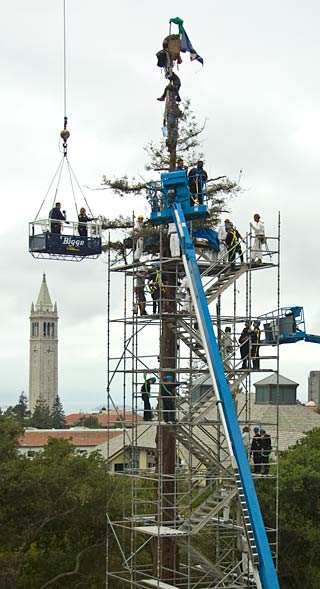UC Berkeley Web Feature
Stadium update: A periodic briefing |
BERKELEY – In a circus din of chainsaws, chants, choppers, and the drumbeats of recycling bins and water-cooler bottles, an audience of several hundred — from protest supporters to curious onlookers — witnessed the peaceful conclusion Tuesday (Sept. 9) to the 21-month-long tree-sit near the western wall of Memorial Stadium.
The finale came at 1:30 p.m., when the last of four remaining tree-sitters descended from the uppermost reaches of a lonely redwood, coaxed down by UC Police Chief Victoria Harrison, who spoke with them for several hours from a basket dangling from a crane, just feet away from the top of the 100-foot redwood, as TV news helicopters hovered above.
"Our intention all along was to try to talk them out," Harrison explained later, speaking this time from the relative comfort of the stadium's Hall of Fame Room, where campus officials held an afternoon press conference. The often-tense operation involved some 45 UC police officers, backed by dozens of workers removing branches, building a scaffold up to the sitters' "crow's nest" at the tip of the stripped-down tree, and operating cranes and cherry-pickers. The Berkeley Fire Department was standing by, as were paramedic teams.
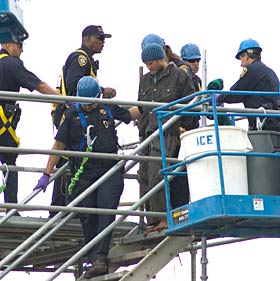 Police escort the first protester to end his sit-in down the scaffolding stairs. |
Contrary to some reports, Brostrom said there was "no quid pro quo" between the campus and the protesters. The university, he said, rejected demands to create a committee to allow for community input on campus land-use decisions, but stands by its ongoing commitment to such involvement. "It is, of course, in our interest to avoid these kinds of long, protracted delays in our projects," he said.
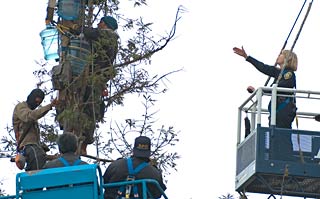 UCPD Chief Victoria Harrison (right), suspended in a basket, talks with protesters perched precariously atop the redwood tree. |
"This has been a difficult 21 months," acknowledged Athletic Director Sandy Barbour. On behalf of the 400 student-athletes who will eventually use the new facility, she added, "I'd like to thank our fans and supporters for keeping the faith," and for "staying the course with us."
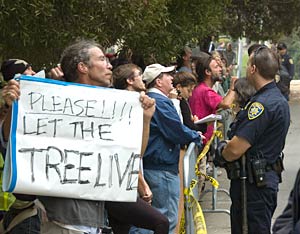 Across Piedmont Avenue from the construction site, tree-sit supporters, counter-protesters, and interested passers-by are restrained behind police barricades. |
The planned seismic retrofit of the stadium itself — phase two of the project — could be accelerated and finished as much as two years earlier than planned, noted Brostrom.
Meanwhile, campus officials said they were relieved that the protest had come to a peaceful end. "This truly, truly was a team effort," said Harrison, who noted the ambitious scaffolding operation was contemplated three months ago, but had to wait for this week's lifting of a court injunction against removal of the surrounding trees at the site.
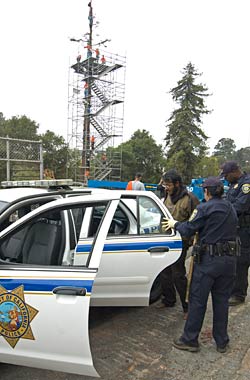 The final protester to climb down from the tree is placed in a waiting police car. Behind him, workers speedily dismantle the scaffolding that they had erected around the redwood tree only hours earlier. |


